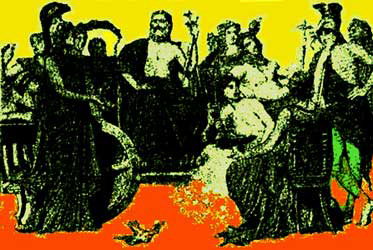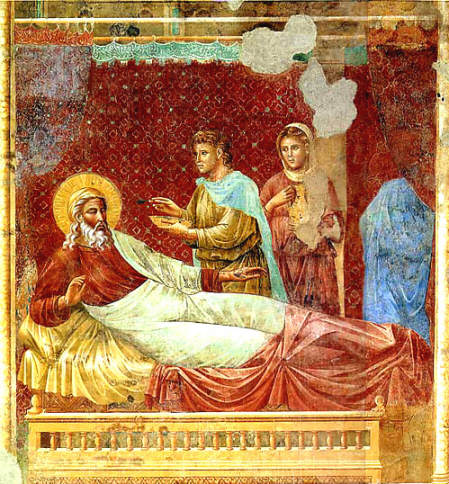Apr
17
2013
 Priests and Levites of All Nations
Priests and Levites of All Nations
Part 1 | Part 2 | Part 3 | Part 4 | Part 5 | Part 6
In this final post on the structure of Ephesians, we will cover stage 6 (Conquest/Atonement) and stage 7 (Glorification/Booths). (Unfortunately, I can’t refer to them as cycles because there are 8 cycles, as previously discussed.)
A common interpretation of the “armor of God” relies on the assumption that Paul is using the kit of a Roman soldier as a metaphor. This shows how fragmented is our understanding of the Bible, an organic text which is not fragmented at all, and not reliant upon the various contemporary cultures anywhere near as much as we assume. The armor in Ephesians 6 is that of a priest, a priest with a sword, fulfilling his guard duty at the gate of God.
Continue reading
Comments Off | tags: Covenant Theology, Ephesians, High Priest, Levites, Literary Structure, Revelation, Tabernacle | posted in Bible Matrix, Biblical Theology, The Last Days
Apr
8
2013
 Part 1 | Part 2 | Part 3 | Part 4 | Part 5
Part 1 | Part 2 | Part 3 | Part 4 | Part 5
We have reached the fifth stage of the matrix in Paul’s letter to the Ephesians, which is the sixth cycle (as discussed in part 5, stage 3 — Ascension — is often split into two parts, altar and sacrifice).
So this fifth section is the “Deuteronomy” of the epistle. It is a New Covenant version of Moses giving his final words to the children of Israel before the conquest of the Land. Likewise, Paul himself, and all the other apostles (except perhaps for John, the final word) would be gone before the rulers of the Land (Revelation’s “kings of the earth”) would be wiped off the face of it forever.
As in all previous cycles, there are some real literary wonders here, which is especially satisfying to see when the passages themselves (unparsed) are so familiar. It’s like seeing old friends in a new way: the letter resurrected and alive and walking around.
Continue reading
Comments Off | tags: Covenant Theology, Daniel, Ephesians, Feasts, Literary Structure | posted in Bible Matrix, Biblical Theology
Mar
31
2013
Covenant Structure in Judges 14-15:8

“I will open my mouth in a parable;
I will utter dark sayings from of old… “
Psalm 78:2
The account of Samson’s marriage and the subsequent collateral damage is one of those stories out of which teachers and preachers try in vain to wring a moral. After all, isn’t that what the Old Testament is for? Actually, no. It is a history of God’s Covenants, and every single text, whether historical narrative or prophetic vision, has a Covenant structure. Certainly, there are morals, but some stories resist such an obvious use (unless we are willing to cook the Book). These stories of God’s delegated authorities are intended to illustrate the work of God in the world.
Continue reading
Comments Off | tags: Covenant Theology, Feasts, Judges, Literary Structure, Samson | posted in Bible Matrix, Biblical Theology
Mar
27
2013

“For thus says the Lord of hosts: ‘Once more (it is a little while) I will shake heaven and earth, the sea and dry land…”
(Haggai 2:6)
Many modern commentators hamstring various parts of the Bible so they don’t run against the grain of modern scientism and historical revisionism. They do this by “classifying” the bits of Scripture that offend modern theory into neat literary genres. “If Genesis is poetry, it can’t be historical,” and other stupidities. Nice try. Another one is “apocalyptic,” a genre which, to the eye of unbelief, might appear to actually exist.
Continue reading
2 comments | tags: Covenant Theology, Genesis, Hermeneutics, James Jordan, Revelation | posted in Biblical Theology, The Last Days
Jan
15
2013

“Jacob didn’t steal the future. He rescued it from a Man who put food first and whose eyes were not yet opened.”
James Jordan has done the Church a great service by rehabilitating the reputations of Noah the drunk, Abraham the liar, Jacob the swindler and Moses the murderer. He has shown us that the context of these so-called sins and crimes mean that they are nothing of the sort. [1] By this, I don’t mean “cultural context” but Covenant context. The reason these great men of God (and their wonderful women) get such a bad rap is because their stories are treated like a bunch of separate things that occurred, from which we must draw obvious and disconnected morals, rather than a single narrative begun in Genesis 1.
Continue reading
Comments Off | tags: Abraham, Covenant Theology, Esau, Genesis, Isaac, Jacob, James Jordan, Noah | posted in Bible Matrix, Biblical Theology
Dec
27
2012
or Shekinah People

“The solution here is not, as Calvin believed, to dress the New Covenant’s ethical maturity in the puerile clothing of paedobaptism.”
In The Failure of the American Baptist Culture [PDF], James Jordan, Ray Sutton and others expose the rot at the heart of baptistic theology, which is inherently man-centred. The authors call us from a view of salvation in isolation to a wider vision of the meaning of baptism, which signifies the broader realities of the Covenant of Grace. I learned a great deal about history and Reformed theology, and thoroughly recommend it to you. In my view, however, they don’t go far enough. A call to understand the vital historical connection between circumcision and baptism certainly deals with the errors of the Anabaptists, but when rightly understood, the progressive nature of revelation also exposes the use of paedobaptism as a connection with the Old Covenant as entirely bogus.
Continue reading
4 comments | tags: Baptism, Calvin, Covenant Creationism, Covenant Theology, Federal Vision, James Jordan, Ray Sutton, Tabernacle | posted in Bible Matrix, Biblical Theology, Ethics, Quotes, The Restoration Era
Dec
8
2012

Part 1 | Part 2 | Part 3 | Part 4 | Part 5
We have reached the sixth cycle of Numbers, which seems to include chapters 30-34. Seeing as it has been a while since we looked at Numbers, here’s the overview again, with this next cycle in red.
Overview of Numbers
Genesis/Transcendence – Creation:
1 – Israel called and arranged as a New Creation
Exodus/Hierarchy – Division/Delegation/Passover:
2 – Leadership disputes, failures and judgments
Leviticus/Ethics Given – Ascension/Firstfruits/Altar:
3 – Levitical offerings and “firstfruits” victories
Numbers/Ethics Opened – Testing/Pentecost:
4 – Israel fails the jealous inspection
Deuteronomy/Ethics Received – Maturity/Trumpets:
5 – Israel’s national festal offerings
Joshua/Sanctions – Atonement/Vindication:
6 – Vengeance upon Midian, Dividing the Land
Judges/Succession – Booths/Glory
7 – Yet to see
Continue reading
Comments Off | tags: Ark of the Covenant, Balaam, Covenant curse, Covenant Theology, James Jordan, Joshua, Literary Structure, Moses, Numbers, Phinehas | posted in Bible Matrix, Biblical Theology
Nov
30
2012
or Thirty Pieces of Silver

“A Christian culture is a culture of opportunity because it is a culture that flows from the Covenant.”
The Bible Matrix is found throughout the Bible. It is the shape of Creation but it is also the shape of Covenant. It is the process of promise and fulfilment. We see it in Eden. We see it in Canaan. Every Covenant is a mission, a tour of duty, resulting in a safe place to live, a home of abundance, peace and glory. It should be no surprise to Christians that it is also the process that underpins economic growth.
Continue reading
2 comments | tags: Covenant Theology, Economics, Ray Sutton, Worship as commerce | posted in Bible Matrix, Biblical Theology, Christian Life
Nov
9
2012
or The Federal Vision’s Adam and Steve

Pushing something to its logical conclusions is most often a wise thing to do. If you have good data to start with (unlike those pushing global warming) the resulting “computer model” can be very helpful. This is also the case with biblical doctrine. It is very helpful to push hyperpreterism to its logical conclusions, which damn it entirely. It is also very helpful to push biblical typology to its logical conclusions. This may sound harebrained to some, but if done within the constraints the Bible itself gives us, false doctrine should stand out like blood stains under ultraviolet light.
Continue reading
Comments Off | tags: Baptism, Circumcision, Covenant Theology, Federal Vision, Postmillennialism | posted in Bible Matrix, Biblical Theology, Ethics
Oct
18
2012

Part 1 | Part 2 | Part 3
Strange Fire
We’ve reach the central “cycle” of the book of Numbers, the attempt by Balak to destroy Israel. To the unbeliever, it is a story about a talking donkey. For believers, it is a story about a wicked prophet and a carnal people. For those with a wide angle “Bible Matrix” lens, the entire landscape suddenly comes into focus as something familiar and terrifying.
Continue reading
3 comments | tags: Aaron, Balaam, Compromise, Covenant curse, Covenant Theology, Joshua, Literary Structure, Lot, Luke Welch, Moses, Numbers, Numbers 5, Phinehas | posted in Bible Matrix, Biblical Theology, The Last Days
 Priests and Levites of All Nations
Priests and Levites of All Nations

































